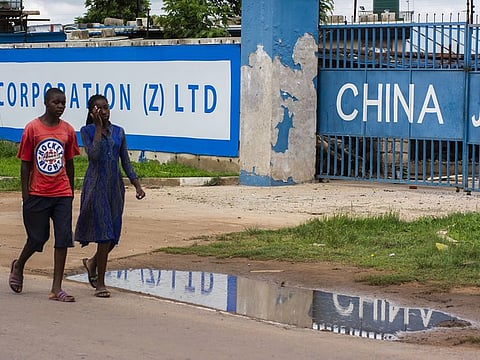How China is outpacing the US in Africa
A giant economy and global superpower, China has a solid footprint all over Africa

Recently, I was in a small Ethiopian town for a workshop. While walking on a street with an American colleague, some kids came running to shake hands with him.
Growing up in India, I am used to it, but what surprised me was that those kids who rarely see an outsider were confusing him as Chinese. The reason for bringing this anecdote here is to show how China is dominating Africa’s economic landscape these days.
Africa is a continent on the rise. It constitutes one-fifth of the world’s land area and is home to 54 independent countries. Africa is also the second-fastest growing region in the world.
This $2 trillion economy is heading towards becoming a $5 trillion economy as the continent’s population is expected to double and cross the 2 billion mark by 2050. Moreover, it has also become the fastest-urbanising part of the world. Africa’s rise has made it one of the epicenters of the power struggle between the US and China.
Also Read: US-China relations enter a crucial phase
China is a giant economy, already a global superpower, and is extensively present on the African continent. China has not only become a key trading power in Africa, but it has also become a contractor, a financier, a service provider, a donor, and an investor. China’s investment in Africa was close to $5 million in 1991, but by 2020 it jumped to $43.4 billion.
China is already the 4th largest investor in Africa after the Netherlands, the UK, and France, and it has moved ahead of the US since 2014.
Africa’s trade with China is also growing at an equally phenomenal speed. In the 1980s, trade between China and Africa only totaled $12 million per year, but by 2021, it reached $254 billion. Compared to it, the US-Africa trade was only $64.3 billion last year.
With an increasing role in Africa’s economic growth and development, China has almost outcompeted the Western liberal-democratic development model that was the only ‘game in town’ since the end of the Cold War.
Chinese finance has given a choice to African leaders as they are not only dependent upon the US and Europe and their controlled financial institutions. Investment from China supports the long-term potential for the development of African economies.
China funds African countries to build their infrastructure, assists other core sectors such as agriculture, water, health, and education, and immensely contributes to growth and development opportunities through increased trade and infrastructural capacity. Beijing’s official development assistance is explicitly non-prescriptive and has no strings attached.
China’s increasing presence in Africa has also made other emerging economies take an active interest in the African continent. Its engagement across the continent is helping to create local jobs.
One narrative that dominates the thinking in the West is that Chinese loans to African countries are nothing but debt-trap diplomacy. Some Chinese investment and infrastructure projects don’t seriously adhere to environmental impact assessment.
However, there is no evidence till today that China has grabbed the properties in any country in Africa or anywhere in the world in return for unpaid debts.
On the other hand, Chinese investments have provided African countries with modern know-how and technology. Chinese investments in African infrastructure have enhanced the overall productive capacity of African economies.
Upper hand vis-à-vis the US
China has gained the upper hand vis-à-vis the US in having an economic presence in Africa, but the US still dominates the continent militarily. China only has a military base in Djibouti, while the US has ten military installations in different parts of Africa.
Interestingly China has been giving much more development aid to Africa for the last ten years than the US. China owns 17 ports in Africa, and it has also increased its arms sales to the continent and is on the verge of outperforming the US.
There is no doubt that China’s growing presence in Africa has brought many advantages to African countries and their economies. Instead of blaming China, the US should work towards getting more economically engaged in Africa.
The gradual economic withdrawal by the US from Africa is harming America’s financial and strategic interests, and Africa has enough opportunities for both -- the US and China. The Afrobarometer poll suggests most Africans also view the political and economic influence of China and the US favorably.
Africa wants America to engage more economically, but the US has not prioritised it in the recent past. However, the US is starting to realise that Africa has become a major geopolitical player and can’t afford to withdraw from the region in the face of Chinese competition.
In August 2022, the White House introduced a policy document to reframe Africa’s importance to US national security interests.
Time will tell if the US will be successful in re-engaging in Africa or not, but the outcome of it will be crucial for the US to maintain its dominant global superpower status vis-à-vis China.
Sign up for the Daily Briefing
Get the latest news and updates straight to your inbox




